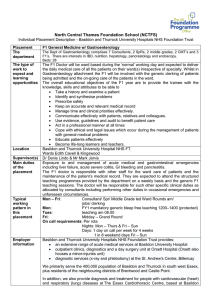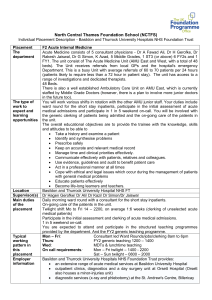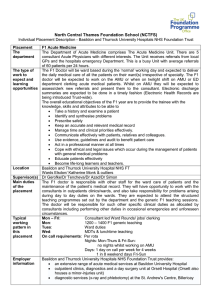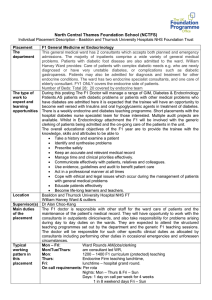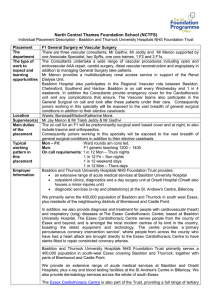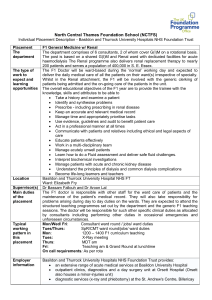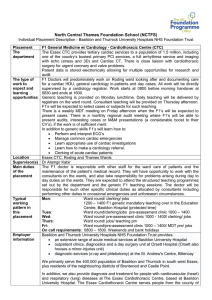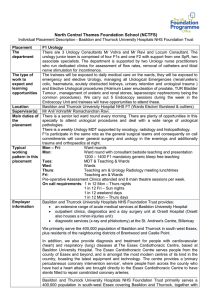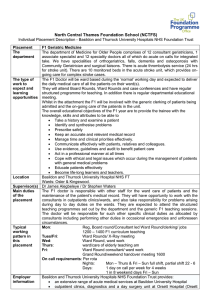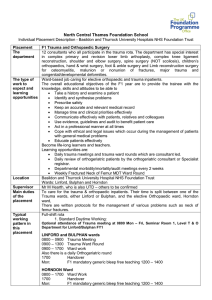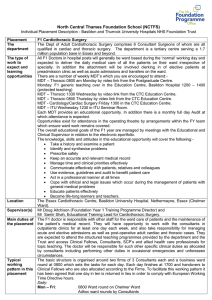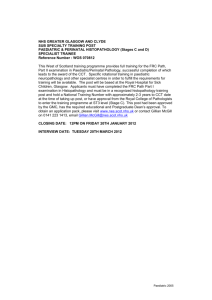North Central Thames Foundation School (NCTFS)
advertisement
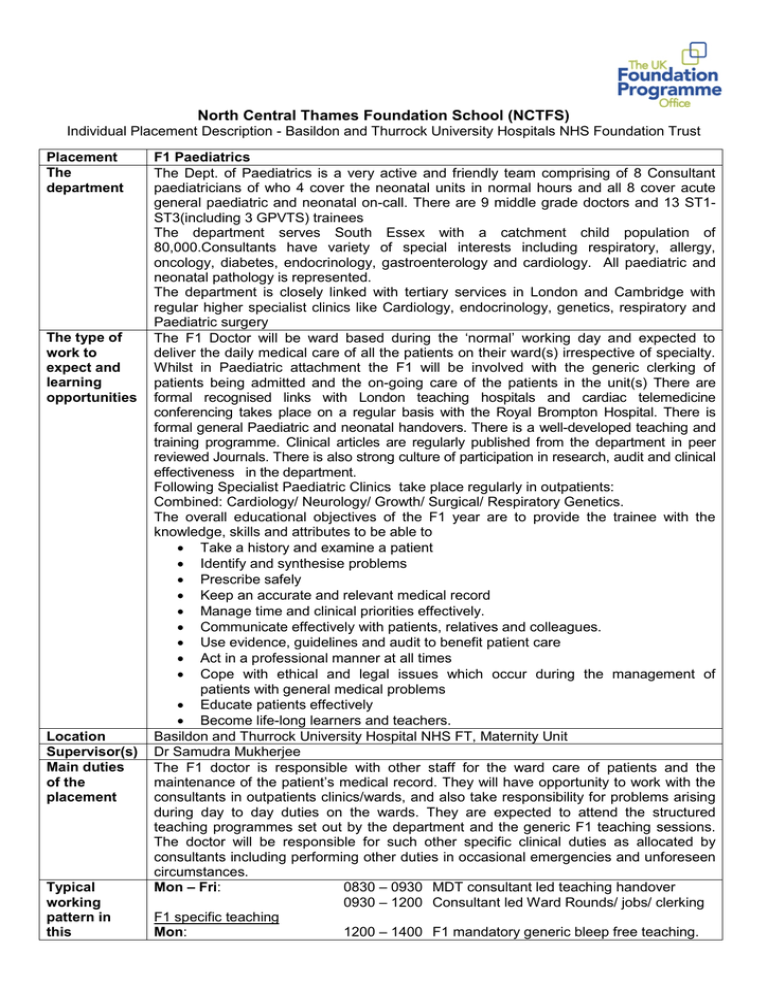
North Central Thames Foundation School (NCTFS) Individual Placement Description - Basildon and Thurrock University Hospitals NHS Foundation Trust Placement The department The type of work to expect and learning opportunities Location Supervisor(s) Main duties of the placement Typical working pattern in this F1 Paediatrics The Dept. of Paediatrics is a very active and friendly team comprising of 8 Consultant paediatricians of who 4 cover the neonatal units in normal hours and all 8 cover acute general paediatric and neonatal on-call. There are 9 middle grade doctors and 13 ST1ST3(including 3 GPVTS) trainees The department serves South Essex with a catchment child population of 80,000.Consultants have variety of special interests including respiratory, allergy, oncology, diabetes, endocrinology, gastroenterology and cardiology. All paediatric and neonatal pathology is represented. The department is closely linked with tertiary services in London and Cambridge with regular higher specialist clinics like Cardiology, endocrinology, genetics, respiratory and Paediatric surgery The F1 Doctor will be ward based during the ‘normal’ working day and expected to deliver the daily medical care of all the patients on their ward(s) irrespective of specialty. Whilst in Paediatric attachment the F1 will be involved with the generic clerking of patients being admitted and the on-going care of the patients in the unit(s) There are formal recognised links with London teaching hospitals and cardiac telemedicine conferencing takes place on a regular basis with the Royal Brompton Hospital. There is formal general Paediatric and neonatal handovers. There is a well-developed teaching and training programme. Clinical articles are regularly published from the department in peer reviewed Journals. There is also strong culture of participation in research, audit and clinical effectiveness in the department. Following Specialist Paediatric Clinics take place regularly in outpatients: Combined: Cardiology/ Neurology/ Growth/ Surgical/ Respiratory Genetics. The overall educational objectives of the F1 year are to provide the trainee with the knowledge, skills and attributes to be able to Take a history and examine a patient Identify and synthesise problems Prescribe safely Keep an accurate and relevant medical record Manage time and clinical priorities effectively. Communicate effectively with patients, relatives and colleagues. Use evidence, guidelines and audit to benefit patient care Act in a professional manner at all times Cope with ethical and legal issues which occur during the management of patients with general medical problems Educate patients effectively Become life-long learners and teachers. Basildon and Thurrock University Hospital NHS FT, Maternity Unit Dr Samudra Mukherjee The F1 doctor is responsible with other staff for the ward care of patients and the maintenance of the patient’s medical record. They will have opportunity to work with the consultants in outpatients clinics/wards, and also take responsibility for problems arising during day to day duties on the wards. They are expected to attend the structured teaching programmes set out by the department and the generic F1 teaching sessions. The doctor will be responsible for such other specific clinical duties as allocated by consultants including performing other duties in occasional emergencies and unforeseen circumstances. Mon – Fri: 0830 – 0930 MDT consultant led teaching handover 0930 – 1200 Consultant led Ward Rounds/ jobs/ clerking F1 specific teaching Mon: 1200 – 1400 F1 mandatory generic bleep free teaching. placement Employer information Paediatric teaching also targeted to FY1 Thurs: 1300 – 1400 Paediatric consultant led teaching. Once a month multidisciplinary meetings Safeguarding Paediatric Peer assessment & Review (SPPEAR)meeting- 3rd Friday Childrens Critical Care Case Review Meeting(C4RM)- 2nd Wednesday Morbidity Review Combined Paediatric and obstetrics(Mr COP)-4th Monday On call requirements: no on calls/nights 1 per month weekend days: shifts: generally 0830 – 1630 – including early or late starts Basildon and Thurrock University Hospitals NHS Foundation Trust provides: an extensive range of acute medical services at Basildon University Hospital outpatient clinics, diagnostics and a day surgery unit at Orsett Hospital (Orsett also houses a minor-injuries unit) diagnostic services (x-ray and phlebotomy) at the St. Andrew's Centre, Billericay We primarily serve the 400,000 population of Basildon and Thurrock in south west Essex, plus residents of the neighbouring districts of Brentwood and Castle Point. In addition, we also provide diagnosis and treatment for people with cardiovascular (heart) and respiratory (lung) diseases at The Essex Cardiothoracic Centre, based at Basildon University Hospital. The Essex Cardiothoracic Centre serves people from the county of Essex and beyond, and is amongst the most modern centres of its kind in the country, boasting the latest equipment and technology. The centre provides a 'primary percutaneous coronary intervention service', where people from across the county who have had a heart attack are brought directly to the Essex Cardiothoracic Centre to have stents fitted to repair constricted coronary arteries. __________________________________________________________________________________________________ Basildon and Thurrock University Hospitals NHS Foundation Trust primarily serves a 400,000 population in south-west Essex covering Basildon and Thurrock, together with parts of Brentwood and Castle Point. We provide an extensive range of acute medical services at Basildon and Orsett Hospitals, plus x-ray and blood testing facilities at the St Andrew's Centre in Billericay. We also provide dermatology services across the whole of south Essex. The Essex Cardiothoracic Centre is also part of the Trust, providing a full range of tertiary cardiothoracic services for the whole county and further afield. In April 2004, we became one of the first ten NHS foundation trusts in the country, with a Council of Governors comprising local elected members, meaning we could work much more closely with our local community to address and deliver their needs. Local people, patients and staff can become members of the Trust and have a say in the healthcare services we provide. We have more than 10,000 public members and 4,000 staff members. Foundation status gives us have more control over how we spend our money and plan our services. We remain firmly part of the NHS and are subject to NHS standards, performance ratings and inspections. We have always put a high value on training and education and in 1997 we were awarded the status of Associate Teaching Hospital by the Royal Free University College London Medical School. In 2002, the Secretary of State for Health conferred University Hospital status. It is important to note that this description is a typical example of your placement and may be subject to change.
